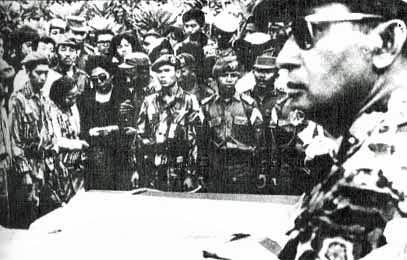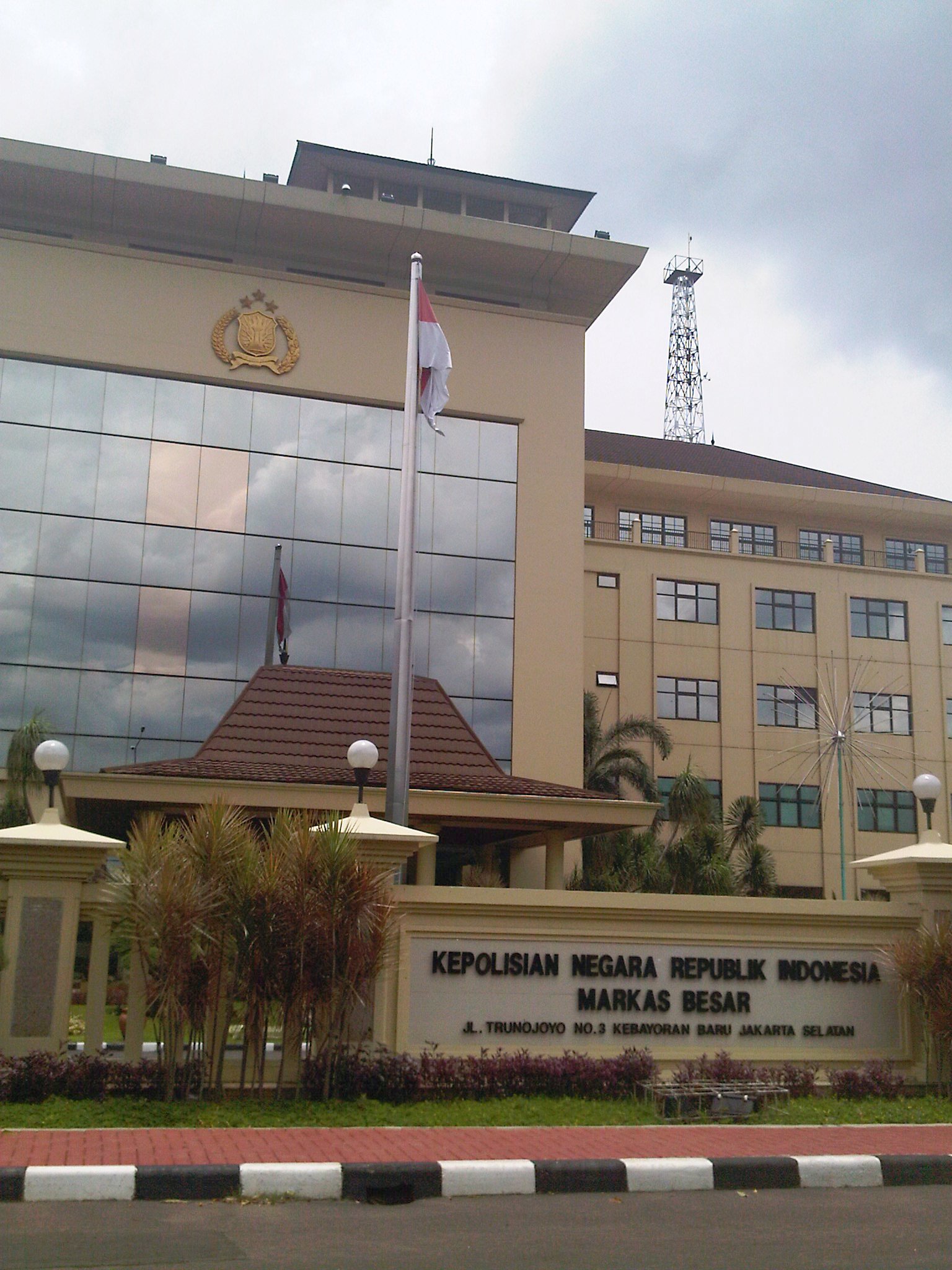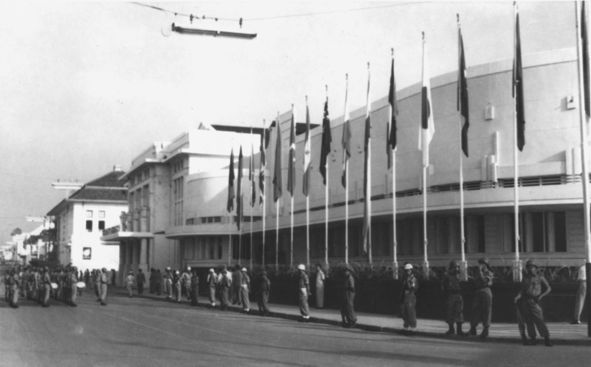|
KAMI (Indonesia)
KAMI, derived from the Indonesia ''Kesatuan Aksi Mahasiswa Indonesia'' ("Indonesian Students Action Union") was an Indonesian anti-communist group formed on 27 October 1965. It consisted of Islamic, Catholic, and former Indonesian Socialist Party (PSI) members. KAMI and other anti-communist student groups were backed by the Indonesian National Armed Forces and organised anti-Sukarno protests which helped strengthen general Suharto's position following the abortive coup attempt that led to the downfall of Indonesian founding president Sukarno. Following the killing of two student demonstrators outside the Presidential Palace in February 1966, Sukarno officially banned KAMI. This was, however, ignored by the students and their supporters and backers within the military forces and the Indonesian National Police. Similar groups formed at this time of retaliation against Communists (who had been blamed for the coup attempt) included a high school students' front, KAPPI (''Kesatuan Ak ... [...More Info...] [...Related Items...] OR: [Wikipedia] [Google] [Baidu] |
Indonesian Language
Indonesian ( ) is the official and national language of Indonesia. It is a standardized variety of Malay, an Austronesian language that has been used as a lingua franca in the multilingual Indonesian archipelago for centuries. Indonesia is the fourth most populous nation in the world, with over 270 million inhabitants—of which the majority speak Indonesian, which makes it one of the most widely spoken languages in the world. James Neil Sneddon. ''The Indonesian Language: Its History and Role in Modern Society''. UNSW Press, 2004. Most Indonesians, aside from speaking the national language, are fluent in at least one of the more than 700 indigenous local languages; examples include Javanese and Sundanese, which are commonly used at home and within the local community. However, most formal education and nearly all national mass media, governance, administration, and judiciary and other forms of communication are conducted in Indonesian. Under Indonesian rule from ... [...More Info...] [...Related Items...] OR: [Wikipedia] [Google] [Baidu] |
Socialist Party Of Indonesia
The Socialist Party of Indonesia ( id, Partai Sosialis Indonesia) was a political party in Indonesia from 1948 until 1960, when it was banned by President Sukarno. Origins In December 1945 Amir Sjarifoeddin's Socialist Party of Indonesia (Parsi) and Sutan Sjahrir's Socialist People's Party (Parsas), both of which had only recently been established, merged to form the Socialist Party. Sjahrir became leader of the combined party. It was popular among young intellectuals and students as well as members of the underground movements led by the two men during the Japanese occupation of Indonesia.Kahin (1952) p158 At the end of 1945 the Socialist Party gained five of the 25 seats on the working committee of the Central Indonesian National Committee, the ''de facto'' legislature.Kahin (1952) p171 Both Sutan and Amir served terms as prime minister, while other Socialist Party members held senior cabinet posts.Simanjuntak (2003) From 1947, divisions appeared between Sutan and Amir as ... [...More Info...] [...Related Items...] OR: [Wikipedia] [Google] [Baidu] |
Indonesian National Armed Forces
, founded = as the ('People's Security Forces') , current_form = , disbanded = , branches = , headquarters = Cilangkap, Jakarta , website = , commander-in-chief = Joko Widodo , commander-in-chief_title = Commander-in-Chief , chief minister = Mahfud MD , chief minister_title = Coordinating Minister for Political, Legal, and Security Affairs , minister = Lt. Gen. (ret.) Prabowo Subianto , minister_title = Minister of Defence , commander = Admiral Yudo Margono , commander_title = Commander of the Armed Forces , age = 17 , conscription = No , manpower_data = 2016 , manpower_age = , available = 131,000,000 , available_f = , fit = 108,000,000 , fit_f = , reaching = 4,500,000 , reaching_f = , active = 400,000 , ranked = 13th , reserve ... [...More Info...] [...Related Items...] OR: [Wikipedia] [Google] [Baidu] |
Sukarno
Sukarno). (; born Koesno Sosrodihardjo, ; 6 June 1901 – 21 June 1970) was an Indonesian statesman, orator, revolutionary, and nationalist who was the first president of Indonesia, serving from 1945 to 1967. Sukarno was the leader of the Indonesian struggle for independence from the Dutch colonialists. He was a prominent leader of Indonesia's nationalist movement during the colonial period and spent over a decade under Dutch detention until released by the invading Japanese forces in World War II. Sukarno and his fellow nationalists collaborated to garner support for the Japanese war effort from the population, in exchange for Japanese aid in spreading nationalist ideas. Upon Japanese surrender, Sukarno and Mohammad Hatta declared Indonesian independence on 17 August 1945, and Sukarno was appointed president. He led the Indonesian resistance to Dutch re-colonisation efforts via diplomatic and military means until the Dutch recognition of Indonesian independe ... [...More Info...] [...Related Items...] OR: [Wikipedia] [Google] [Baidu] |
Suharto
Suharto (; ; 8 June 1921 – 27 January 2008) was an Indonesian army officer and politician, who served as the second and the longest serving president of Indonesia. Widely regarded as a military dictator by international observers, Suharto led Indonesia through a dictatorship for 31 years, from the fall of Sukarno in 1967 until his own resignation in 1998. The legacy of his 31-year rule, and his US$38 billion net worth, is still debated at home and abroad. Suharto was born in the small village of Kemusuk, in the Godean area near the city of Yogyakarta, during the Dutch colonial era. He grew up in humble circumstances. His Javanese Muslim parents divorced not long after his birth, and he lived with foster parents for much of his childhood. During the Japanese occupation era, Suharto served in the Japanese-organized Indonesian security forces. During Indonesia's independence struggle, he joined the newly formed Indonesian Army. There, Suharto rose to the rank of major ... [...More Info...] [...Related Items...] OR: [Wikipedia] [Google] [Baidu] |
Transition To The New Order
Indonesia's transition to the New Order in the mid-1960s ousted the country's first president, Sukarno, after 22 years in the position. One of the most tumultuous periods in the country's modern history, it was the commencement of Suharto's 31-year presidency. Described as the great '' dhalang'' ("puppet master"), Sukarno drew power from balancing the opposing and increasingly antagonistic forces of the army and Indonesian Communist Party (PKI). By 1965, the PKI extensively penetrated all levels of government and gained influence at the expense of the army. On 30 September 1965, six of the military's most senior officers were killed in action (generally labelled an "attempted coup") by the so-called 30 September Movement, a group from within the armed forces. Within a few hours, Major General Suharto mobilised forces under his command and took control of Jakarta. Anti-communists, initially following the army's lead, went on a violent purge of communists throughout the coun ... [...More Info...] [...Related Items...] OR: [Wikipedia] [Google] [Baidu] |
Indonesian National Police
'' , mottotranslated = (Serving the Nation) , formed = , preceding1 = , dissolved = , superseding = , employees = 440,000 (2020) , volunteers = , budget = , nongovernment = , country = Indonesia , countryabbr = , national = Yes , federal = , international = , divtype = , divname = , divdab = , subdivtype = , subdivname = , subdivdab = , map = , mapcaption = , sizearea = , sizepopulation = , legalpersonality = Police force , legaljuris = National , governingbody = , governingbodyscnd = , constitution1 = Act No. 2 of 2002 on State Police , police = Yes , local = , military = , provost = , gendarmerie = , religious = , speciality = , secret = , o ... [...More Info...] [...Related Items...] OR: [Wikipedia] [Google] [Baidu] |
Masyumi
The Council of Indonesian Muslim Associations ( id, Partai Majelis Syuro Muslimin Indonesia), better known as the Masyumi Party, was a major Islamic political party in Indonesia during the Liberal Democracy Era in Indonesia. It was banned in 1960 by President Sukarno for supporting the PRRI rebellion. Background In 1909, a trade organization called the Islamic Trading Association ( id, Sarekat Dagang Islam) was established in Java, then part of the Dutch East Indies to protect the interests of batik traders in the face of competition from ethnic Chinese merchants. In 1912, this became the Sarekat Islam (Islamic Union), and was headed by western-educated Oemar Said Tjokroaminoto. Although it began as a non-political organization, it began to speak out against injustice and poverty. By 1918, it had 450,000 members. Communist influence within it grew, but so did that of the reformist Islamic Muhammadiyah organization, which was anti-communist. In 1920, Muhammadiyah merged into ... [...More Info...] [...Related Items...] OR: [Wikipedia] [Google] [Baidu] |
People's Consultative Assembly
The People's Consultative Assembly of the Republic of Indonesia ( id, Majelis Permusyawaratan Rakyat Republik Indonesia, MPR-RI) is the legislative branch in Indonesia's political system. It is composed of the members of the People's Representative Council (DPR) and the Regional Representative Council (DPD). Before 2004, and the amendments to the 1945 Constitution, the MPR was the highest governing body in Indonesia. In accordance with Law No. 16/1960, the assembly was formed after the general election in 1971. It was decided at that time that the membership of the Assembly would be twice that of the House. The 920 membership of MPR continued for the terms of 1977–1982 and 1982–1987. For the terms 1987–1992, 1992–1997, and 1997–1999 the MPR's membership became 1000. One hundred members were appointed representing delegations from groups as addition to the faction delegates of Karya Pembangunan (FKP), Partai Demokrasi Indonesia (FPDI), Persatuan Pembangunan ... [...More Info...] [...Related Items...] OR: [Wikipedia] [Google] [Baidu] |
Merdeka Building
Merdeka Building (Indonesian: Gedung Merdeka) is an art-deco building in Jalan Asia-Afrika, Bandung, Indonesia. Today it serves as a museum displaying collections and photographs of the Asian–African Conference, the first Non-Aligned Movement event, which was held there in 1955. Architecture The present building was designed in 1926 in Art Deco style by Van Galen and C.P. Wolff Schoemaker, both professors at Technische Hogeschool (today ITB) and famous architects of that time; a further extension was designed in 1940 in Streamline Moderne style by Albert Aalbers. The 7500 m² building had Italian marble floors, some saloon and rooms in ''cikenhout'' wooden finishing, and was adorned with crystal lamps on the ceilings. History The first building on the site at the intersection of Braga Street and Jalan Asia-Africa was constructed in 1895 for the Sociëteit Concordia. In 1926 it was rebuilt by Wolff Schoemacher, Albert Aalbers and Van Gallen. [...More Info...] [...Related Items...] OR: [Wikipedia] [Google] [Baidu] |
Bandung
Bandung ( su, ᮘᮔ᮪ᮓᮥᮀ, Bandung, ; ) is the capital city of the Indonesian province of West Java. It has a population of 2,452,943 within its city limits according to the official estimates as at mid 2021, making it the fourth most populous city in Indonesia. Greater Bandung (Bandung Basin Metropolitan Area/BBMA) is the country's third-largest metropolitan area, with nearly nine million inhabitants. Located above sea level, the highest point in the North area with an altitude of 1,050 meters and the lowest in the South is 675 meters above sea level, approximately southeast of Jakarta, Bandung has cooler year-round temperatures than most other Indonesian cities. The city lies on a river basin surrounded by volcanic mountains that provides a natural defence system, which was the primary reason for the Dutch East Indies government's plan to move the capital from Batavia (modern-day Jakarta) to Bandung. The Dutch first established tea plantations around the mo ... [...More Info...] [...Related Items...] OR: [Wikipedia] [Google] [Baidu] |
Student Political Organizations
A student is a person enrolled in a school or other educational institution. In the United Kingdom and most commonwealth countries, a "student" attends a secondary school or higher (e.g., college or university); those in primary or elementary schools are "pupils". Africa Nigeria In Nigeria, education is classified into four system known as a 6-3-3-4 system of education. It implies six years in primary school, three years in junior secondary, three years in senior secondary and four years in the university. However, the number of years to be spent in university is mostly determined by the course of study. Some courses have longer study length than others. Those in primary school are often referred to as pupils. Those in university, as well as those in secondary school, are referred to as students. The Nigerian system of education also has other recognized categories like the polytechnics and colleges of education. The Polytechnic gives out National Diploma and Higher Nation ... [...More Info...] [...Related Items...] OR: [Wikipedia] [Google] [Baidu] |








